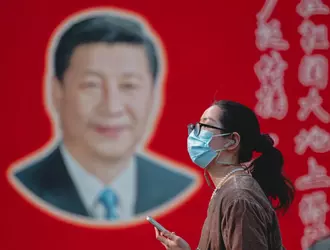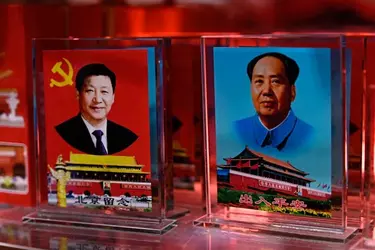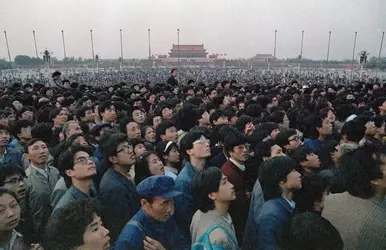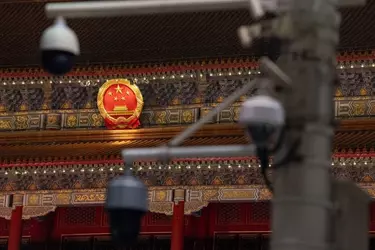
Xi Jinping has spent lavishly on reinforcing the country’s authoritarian tools. Photo: Alex Plavevski/Shutterstock
By Josh Chin
April 23, 2025 11:00 pm ET
As President Trump tries to play hardball in his trade war with Xi Jinping, he faces an adversary who has armed China to play a long and potentially painful game in its contest with the U.S.
In the weeks since the U.S. president first slapped sky-high tariffs on China, Beijing has responded with defiance. A spokeswoman for China’s Foreign Ministry posted on X footage from 1953 of Mao Zedong promising to fight to the end against U.S.-led forces in the Korean War. “We are Chinese,” she wrote. “We don’t back down.”
The Mao post and other messages from Beijing highlight what China sees as one of its core advantages against the U.S.: While Trump and his Republican backers are vulnerable to the whims of American voters, the party that Mao built is deeply entrenched, having maintained power through more than seven decades despite war, famine, political upheaval and financial crises.
Xi isn’t resting on those laurels. Since an earlier trade war during the first Trump administration, he has intensified his grip on the country’s leadership and spent lavishly reinforcing the authoritarian tools that underpin the party’s longevity, including enhancements of the world’s most sophisticated systems for censorship and surveillance. The Chinese leader wants to harden his country specifically for a confrontation with the U.S., urging officials to engage in what he calls “extreme scenario thinking.”

Portraits of Xi Jinping and Mao Zedong for sale at a souvenir shop in Beijing. Photo: Pedro Pardo/Agence France-Presse/Getty Images
Trump has already struck a more conciliatory tone this week, saying he wants to enter into negotiations with Beijing and is willing to lower the 145% tariffs he has imposed on China in his second term.
The White House hasn’t said what it ultimately hopes to achieve in negotiations with China. Any push to significantly reduce the U.S.’s $295 billion trade deficit would require China to fundamentally change its economic model.
In Xi, Trump is facing off with an equally pugilistic figure. Before he even took power, Xi swiped at “foreigners with full bellies and nothing better to do” who had the temerity to criticize China. He has repeatedly stated his belief that the age of American dominance is nearing its end, due in large part to the capitalist excesses of the very consumer-driven economy the U.S. hopes to foist on China.
Where the Trump administration is riven with factions and embraces chaos, Xi has focused on stability. He eliminated term limits in 2018 and has used an endless crackdown on corruption to centralize power to a greater degree than any leader since Mao. He has also packed the party’s senior leadership with officials experienced in propaganda and security, who have made it a priority to inoculate China against the risk of mass dissent.
“Chinese society has an incredibly high capacity for pain,” said Yasheng Huang, a professor of global economics at the MIT Sloan School of Management and author of the forthcoming “Statism with Chinese Characteristics.”
“There is one scenario in which stability breaks down and this is the scenario in which there is a serious split among top leaders, as happened in 1989,” Huang said, referring to internal party divisions over that year’s pro-democracy protests in Tiananmen Square. China is now further away from such a rupture than at any other time since the start of the post-Mao reform era in 1978, according to Huang.

The Tiananmen Square pro-democracy protests in 1989 loom large in the minds of China’s leaders. Photo: Associated Press
To be sure, the Trump administration can inflict real pain on China, which is heavily dependent on exports for growth. The country’s debt-laden economy grew by 5% in 2024, according to official figures, though that number has its skeptics. At the start of the earlier China-U.S. trade standoff during Trump’s first term, it was closer to 7%.
By some estimates, the new Trump tariffs could wipe out half or more of Chinese exports to the U.S. Economists at Goldman Sachs estimate that as many as 20 million workers in China are exposed to U.S. exports.
“No political system, and no political leader, could emerge unscathed by tariffs of the dimension proposed by Trump, if they go ahead in a sustained fashion,” said Richard McGregor, a China expert at the Lowy Institute, an Australian think tank. “Factories will close and many thousands of people will lose their jobs, with little in the way of a welfare system to fall back on.”
Workers are the biggest drivers of dissent in China, accounting for more than 40% of in-person and online protests in the country in the first three quarters of 2024, according to tracking by China Dissent Monitor, a project of the U.S.-based nonprofit Freedom House.
President Trump appears to have softened his tone on China, but Beijing’s message remains that it will not negotiate under duress and is prepared to fight to the end. Photo: Mandel Nganpedro Pardo/AFP/Getty Images
Some of the messages aimed at rallying the country for the trade fight have met with skepticism on Chinese social-media sites, suggesting the party could face pushback if the economy were to suffer significantly. Xi has said he worries that China’s young people are unwilling to suffer for the good of the country in the same ways as previous generations.
The Tiananmen Square pro-democracy protests loom large in the minds of Communist Party leaders, who view demonstrations and the bloody crackdown that ended them as an existential crisis fueled by economic mismanagement. While students led the protests, the crowds in and around the square were mostly made up of regular workers angry over consumer inflation that was hovering at 18% that year.
If similar discontent were to boil up as a result of the trade war, the party can turn to a mix of responses, including fiscal stimulus, targeted subsidies for affected industries and even direct handouts to laid-off workers.
It can also wield the vast “stability maintenance” machinery that the party built to raise the political system’s pain threshold after the Tiananmen crackdown, which has ballooned in size and sophistication under Xi. That system includes human- and AI-powered censorship and surveillance networks designed to pre-empt dissent, backed up by an army of police and domestic security agents.

Surveillance cameras in Tiananmen Square. Photo: Bloomberg News
China budgeted the equivalent of $209 billion on domestic security in 2023, the most recent year for which official data is available. That figure, which doesn’t capture spending on surveillance-technology initiatives, amounts to 175% of what the U.S. spent on policing in 2023 when accounting for cost differences in the two countries.
And it recently earmarked roughly $110 billion to fund the implementation of major national strategies and “security capacity-building.”
The party’s control systems faced their biggest test during the Covid-19 epidemic. Government analysis of individuals’ location data initially enabled the government to get the virus under control. After the fast-spreading Omicron variant outran the system, the government used its tracking technologies to lock down several cities.
In Shanghai, face-recognizing surveillance cameras and drones helped police keep an anxious population of 25 million locked in their homes, even as some ran short of food. Censors zapped negative views of the city’s predicament before they could spread widely, paving the way for state media to paint a picture of normality for people in other parts of the country.
In late 2022, after public frustration boiled over into protests in several cities, authorities tracked the phones and faces of protest participants, some of whom they detained and interrogated for weeks. Censorship systems, initially overwhelmed, quickly learned how to neutralize symbols of the protests, including blank pieces of white paper held up by demonstrators as a sign of censorship.

Protesters in Beijing holding up pieces of white paper in 2022. Photo: Kevin Frayer/Getty Images
Xi abruptly scrapped the country’s draconian zero-Covid controls a few weeks after the protests—evidence, according to some analysts, of the Communist Party’s vulnerability. But MIT’s Huang says the episode was the exception that proves the party’s resilience.
The protests erupted “only after months of economic devastation and an incredible level of personal suffering on the part of tens of millions, if not hundreds of millions, of people,” he said. “Once the lockdown ended, the protests fizzled out quickly and didn’t translate into any serious threat to the stability of the regime.”
Since then, Xi has pushed to bolster security systems further. He is encouraging the expansion of human surveillance through the adoption of the “Fengqiao model,” named after a town where residents were known in the Mao era for reporting on their fellow citizens’ errant behavior. The country’s network of intelligent surveillance cameras, already numbering in the hundreds of millions, continues to expand.
Chinese police and other domestic security agencies are actively exploring ways to apply the latest advances in AI to social control, according to government procurement documents and academic papers. That includes the use of AI models to attempt to predict discontent.
One police department in the coastal province of Zhejiang, for example, is experimenting with the use of large multimodal AI models to flag suspicious behaviors and analyze risks from large crowds in real-time surveillance footage.
“The reason they’ve spent all this time building these systems is precisely for the situation they are facing right now,” says Jessica Batke, a former U.S. State Department intelligence analyst now serving as a senior editor at ChinaFile, an online magazine run by the New York-based nonprofit Asia Society.
Source (Archive)

